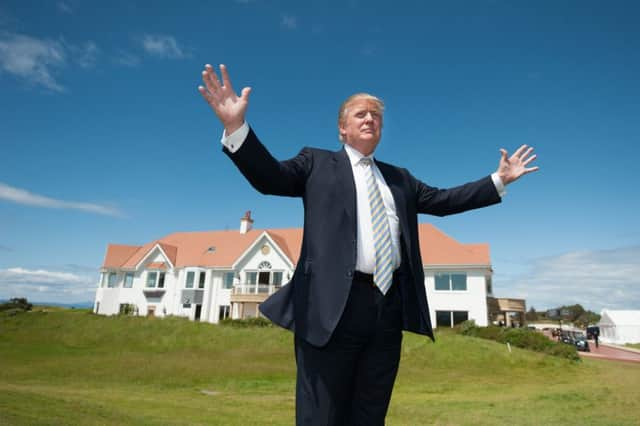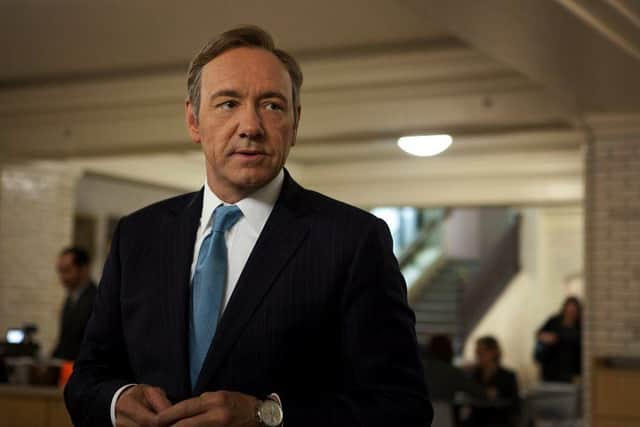Martyn McLaughlin: Donald Trump’s White House trick


The gilded existence of the New York property magnate has many glittering baubles to distract those who come along for the ride. It is a world of fixtures and fittings, where detail is never left to chance and no design is deemed too extravagant. Only the very best and the brand new pass muster. His is an empire of wealth, built with the express intention of accruing more. Stand too close to its artifice and you will be dazzled.
But peer beneath the gold and the marble and the crystal and you will find Donald Trump’s most enduring asset: himself. For decades now, he has cultivated his bluster and braggadocio as a means of furthering his profile and, by extension, his portfolio. Every time, the press and the public fall for it and the circus burls on.
Advertisement
Hide AdAdvertisement
Hide AdThe billionaire’s whirlwind visit to Scotland yesterday was no exception. He arrived to officially open the revamped clubhouse of his latest golfing resort, Trump Turnberry, giving a characteristically modest self-appraisal of the work he has been bankrolling at the grand old course and its celebrated hotel.


“The furniture is on order now,” he announced at one point. “It’s the highest quality furniture money can buy, the highest quality anybody has ever bought for a hotel.” There followed unconfirmed reports that the share price in Travel Lodge remained stable.
When he had finished listing his sparkling inventory, there was one question from the assembled press pack that the property magnate seemed delighted to rebuff, namely the prospect of his joining the race for the presidency of the United States. It was an enquiry prompted by his address at the weekend to Republicans in Raleigh, North Carolina, where he have his strongest hint yet that would seek the party’s nomination. “I think a lot of people are going to be very happy,” he said.
The remark garnered acres of coverage in the US press, who only in March, devoted just as much newsprint to Mr Trump’s announcement that he was about to form a presidential exploratory committee. Little wonder, then, their Scottish counterparts were just as keen to find out more.
Three times Mr Trump was asked about the issue and on occasion he was on message, a glint in his eye. “I will be meeting lots of people at Trump Towers on 16 June and I’m going to make an announcement that will be a very interesting announcement,” he replied. “I think it’s going to make a lot of people very happy.”
The White House has always been a means of leverage for a man with a shrewd eye for marketing who knows that they stand no real chance of election. Nothing makes headlines quite like presidential ambitions, but when a prospective candidate flies across the Atlantic to extol the virtues of Strauss crystal chandeliers instead of visiting a key strategic state, it tells you a great deal about the sincerity of his intentions.
Indeed, Mr Trump’s long, unfulfilled flirtation with the Oval Office is one of the oldest sideshows of American politics, a Harvard business school blend of performance art. It is a courtship he first struck up in October 1987 when he travelled by helicopter to New Hampshire to address to the members of the Portsmouth Rotary Club with a campaign pitch. In the end, he did not run for the following year’s election.
As the years and terms passed, so the same old story re-emerged, each time given the oxygen of publicity. In 2000, Mr Trump said he was “seriously” considering running for president as a Reform Party candidate. He didn’t.
Advertisement
Hide AdAdvertisement
Hide AdFour years on, he announced he was “very seriously” looking at a White house bid. He didn’t.
In 2006, he stressed that while he did not plan to run for governor, he may launch an attempt to enter the White House in 2008. He didn’t.
Two years later, he sparked a campaign with a view to running for president in 2012, during which he made Sarah Palin look like a moderate voice after pursuing preposterous allegations circulating around the darkest nooks of the internet which sought to questioned the legitimacy of President Barack Obama’s birth certificate.
But after going through the motions by giving speeches in New Hampshire and other important states, Mr Trump yet again chose not run. In May 2011, he formally bowed out from the race for the Republican nomination, but not before delivering a line dripping in trademark Trumpese: “I maintain the strong conviction that if I were to run, I would be able to win the primary and, ultimately, the general election.”
In the same statement, Mr Trump acknowledge that running for public office could not be done half-heartedly, but that there was one reason that meant he could not fully commit. “Ultimately, business is my greatest passion and I am not ready to leave the private sector.”
Four years on, there is no reason to suppose that has changed. Mr Trump is making the same noises, delivering applause lines and rolling out time-honoured ripostes about how Washington is broken and only he can fix it. He will not.
He will preside over his empire secure in the knowledge that a few million dollars thrown at a fledgling campaign will reap publicity that would ordinarily have cost tenfold that amount.
In the acutely observed US television show, House of Cards, Kevin Spacey’s Frank Underwood character ruefully reflects on the decision by a member of his congressional staff to take up a lucrative post as a lobbyist. “Such a waste of time, he chose money over power. In this town a mistake nearly everyone makes.” Mr Trump has spent a lifetime fooling us into believing he has made the same error, all the while pimping his businesses, television shows and consolidating his image as an anti-establishment elitist. If the events of recent days are any guide, we are still being dazzled.